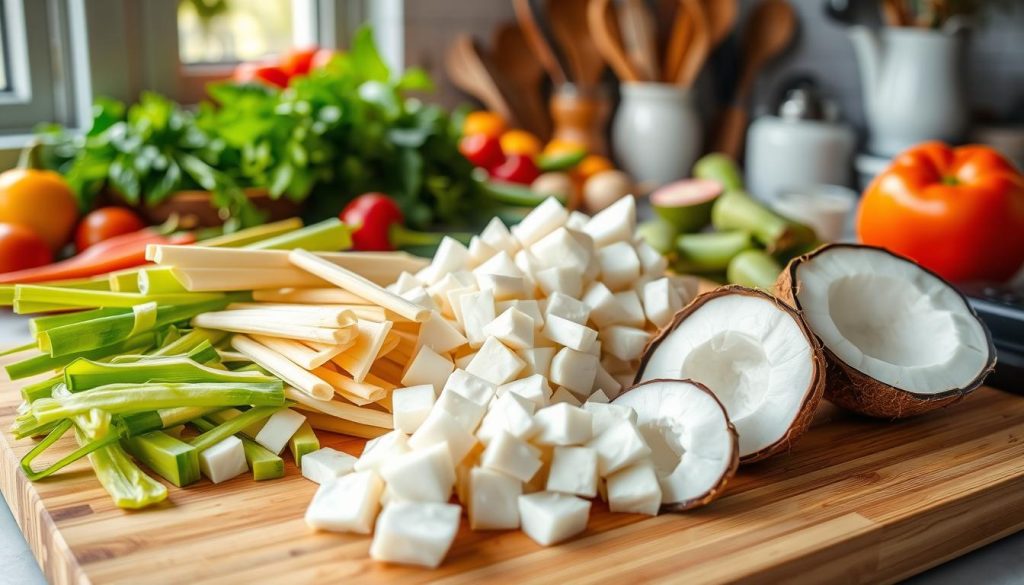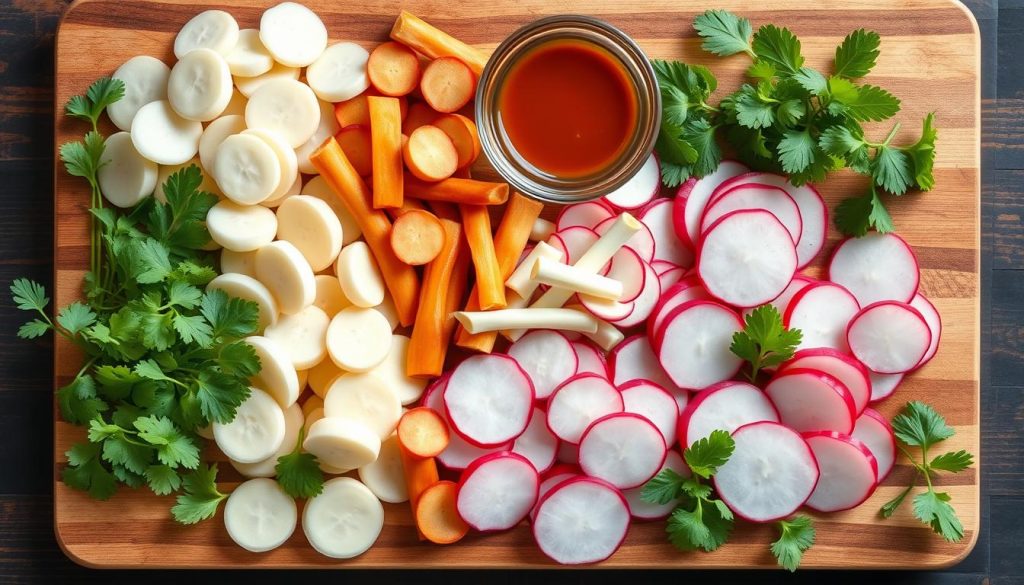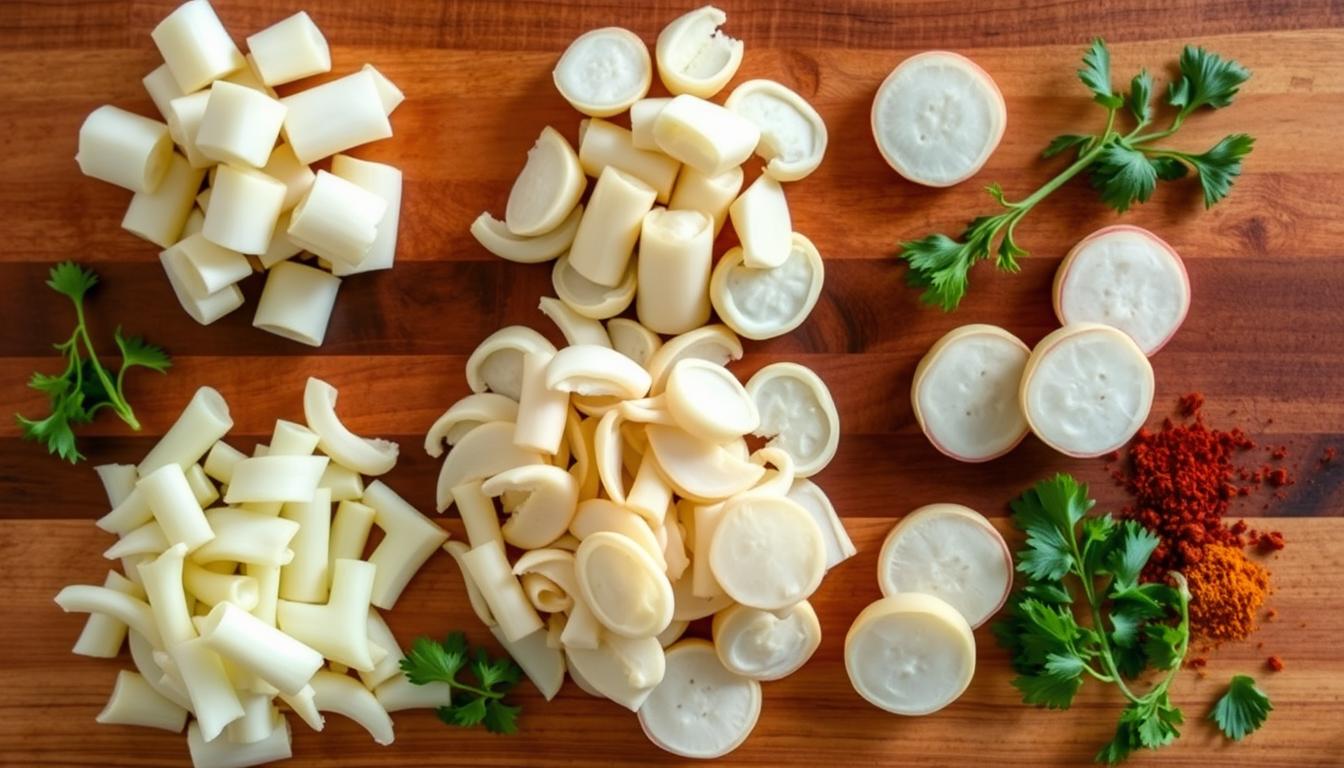Looking for water chestnuts substitutes for your cooking? You’re in the right spot. This guide will show you different options to replace water chestnuts. These alternatives keep the unique crunch and flavor you love, especially in Asian dishes.
Maybe you have dietary restrictions, allergies, or just can’t find water chestnuts. Don’t worry, we’ve got you covered. We’ll share effective substitutes that won’t change the taste or quality of your meals. Let’s explore the best options for your cooking.
Understanding Water Chestnuts
Water chestnuts are a unique ingredient that adds benefits and flavors to dishes. They have a nutritional profile, culinary uses, and a distinct texture and flavor. This makes them a key ingredient in many kitchens.
Nutritional Profile of Water Chestnuts
Water chestnuts are a healthy food choice. A 2/3 cup serving (100 grams) of raw, sliced water chestnuts has about 97 calories. It also has 1 gram of protein and 24 grams of carbohydrates, with 3 grams of fiber.
They are rich in potassium, with 584 mg per serving. This can help lower the risk of stroke and high blood pressure. For those with irritable bowel syndrome (IBS), water chestnuts are a low FODMAP option. They also contain vitamins like B6 and riboflavin, and minerals like manganese and copper.
Culinary Uses of Water Chestnuts
Water chestnuts are versatile in Asian cuisines. Fresh water chestnuts are great in dishes like bacon-wrapped water chestnuts. Canned versions are perfect for recipes where texture matters, like sweet and sour meatballs.
They can be enjoyed raw in salads or cooked in stir-fries. Fresh water chestnuts are available year-round in Asian markets. Canned varieties are more common in local stores, offering flexibility.
Texture and Flavor Characteristics
Water chestnuts have a crisp texture and a subtly sweet, neutral flavor. Fresh ones are sweeter than canned, making them better for recipes where taste matters. Their crunch adds a delightful contrast in dishes.
Proper storage is key to keeping their texture. Unpeeled fresh water chestnuts can last seven to 10 days in the fridge. Opened canned water chestnuts should be used within three days. They absorb flavors well, making them great for many recipes.
Top Alternatives to Water Chestnuts
Looking for water chestnut substitutes can add new textures and tastes to your meals. Each option has its own unique qualities, making them great for different recipes. Here are some top picks for versatile cooking.
Jicama: Crunchy and Versatile
Jicama is a great choice as a water chestnut substitute. It has a sweet, juicy flavor and a crunchy texture. It’s also low in carbs, with only 4.1g per 100g, making it good for those watching their carb intake.
Jerusalem Artichokes: An Earthy Option
Jerusalem artichokes are another good substitute. They have a crunchy texture and an earthy taste. They’re best in raw or cold dishes. Though they have 9g of carbs per 100g, they’re a good choice in moderation.
Bamboo Shoots: Asian Cuisine Favorite
Bamboo shoots are a favorite in Asian cooking. They add a crisp texture to dishes. With just 1.5g of carbs per 100g, they’re a keto-friendly option. They enhance flavors in stir-fries and salads.
Turnips and Radishes: Great Crunch Alternatives
Turnips and radishes are great substitutes for water chestnuts. Thinly sliced turnips can mimic water chestnuts well. Radishes add a refreshing crunch and similar flavors. Both are low in carbs, with 1.8g and 2.1g per 100g, making them good for low-carb diets.
| Substitute | Net Carbs (per 100g) | Flavor Profile | Best Uses |
|---|---|---|---|
| Jicama | 4.1g | Sweet, Juicy | Salads, Stir-fries |
| Jerusalem Artichokes | 9g | Earthy | Raw Dishes, Salads |
| Bamboo Shoots | 1.5g | Crisp | Asian Dishes |
| Turnips | 2.1g | Mild | Soups, Sautéing |
| Radishes | 1.8g | Peppery | Salads, Salsas |
Water Chestnuts Substitute Guide
Substituting water chestnuts can make your dishes better and fit different diets. Knowing how to swap them out keeps the taste and texture right. This guide helps you find good substitutes for your cooking.
How to Substitute Water Chestnuts in Recipes
For water chestnut substitutes, use a 1:1 ratio. Try jicama, Jerusalem artichokes, white turnips, bamboo shoots, celery, and radishes. Each one adds its own special touch:
- Jicama: Great for stir-fries and salads with its crunchy texture.
- Jerusalem artichokes: Good in many recipes, adding an earthy flavor.
- White turnips: Mild taste, perfect for soups and stews.
- Bamboo shoots: Subtle flavor, great in Asian dishes.
- Celery: Easy to find, adds crunch without strong taste.
- Radishes: Peppery and crunchy, best in salads and slaws.
Kitchen Trials: Effective Substitution Ratios
Trying these substitutes in your kitchen will boost your confidence. You’ll find new favorites:
| Substitute | Calories per Cup | Dietary Fiber | Vitamin C (% DV) |
|---|---|---|---|
| Jicama | 46 | 6g | 44% |
| Water Chestnuts | 97 | 3g | Not significant |

Remember these tips for different textures and tastes. Substituting water chestnuts makes your meals better and your cooking more fun.
Benefits of Using Water Chestnuts Substitutes
Looking into alternatives to water chestnuts opens up a world of benefits. These changes can add new flavors and health perks to your cooking. They offer dietary advantages that make your meals healthier and more enjoyable.
Health Advantages of Alternative Ingredients
Switching to jicama, bamboo shoots, or celeriac can be very beneficial. Jicama and bamboo shoots are low in calories but high in fiber. This helps with weight control and improves digestion.
Fresh bamboo shoots add a nice crunch and sweetness to dishes. They make food more interesting and tasty.
Dietary Flexibility and Accessibility
Using flexible ingredients lets you cook for everyone, no matter their dietary needs. Ingredients like Brussels sprouts and Jerusalem artichokes offer new tastes and textures. They keep meals healthy and tasty for all.
By trying these substitutes, you can explore many recipes. This way, you get to enjoy a wide range of flavors and health benefits.

Conclusion
This guide helps you find great substitutes for water chestnuts in cooking. You’ve learned about the benefits of water chestnuts and found alternatives like jicama, Jerusalem artichokes, and bamboo shoots. These options add unique textures and flavors to your dishes.
Now, you can easily replace water chestnuts in your recipes. These substitutes not only mimic the crunch and sweetness of water chestnuts but also offer nutritional benefits. They can make your meals just as tasty and healthy.
Try out these alternatives and see which ones you like best. This will help you improve your cooking skills and enjoy new flavors in your kitchen.
Source Links
- https://theeatdown.com/water-chestnut-substitute/
- https://kitchenmisadventures.com/water-chestnut-substitute
- https://www.thespruceeats.com/all-about-water-chestnuts-694624
- https://www.webmd.com/diet/health-benefits-water-chestnuts
- https://www.seriouseats.com/what-to-do-with-fresh-chinese-water-chestnuts
- https://coachrallyrus.com/keto-recipes/are-water-chestnuts-keto-friendly/
- https://www.amoytopfoods.com/news/water-chestnuts-all-you-need-to-know-instacart-guide-to-fresh-produce
- https://flavorfulhome.com/water-chestnuts-substitute/
- https://cookscrafter.com/water-chestnut-substitutes/
- https://discover.texasrealfood.com/swap-and-savor/how-to-substitute-jicama-for-water-chestnuts
- https://discover.texasrealfood.com/swap-and-savor/how-to-substitute-water-chestnuts-for-bamboo-shoots
- https://www.bbcgoodfood.com/health/nutrition/health-benefits-chestnuts
- https://discover.texasrealfood.com/swap-and-savor/chestnut-substitutes
- https://www.goodtastingmeals.com/substitutes-water-chestnuts/
